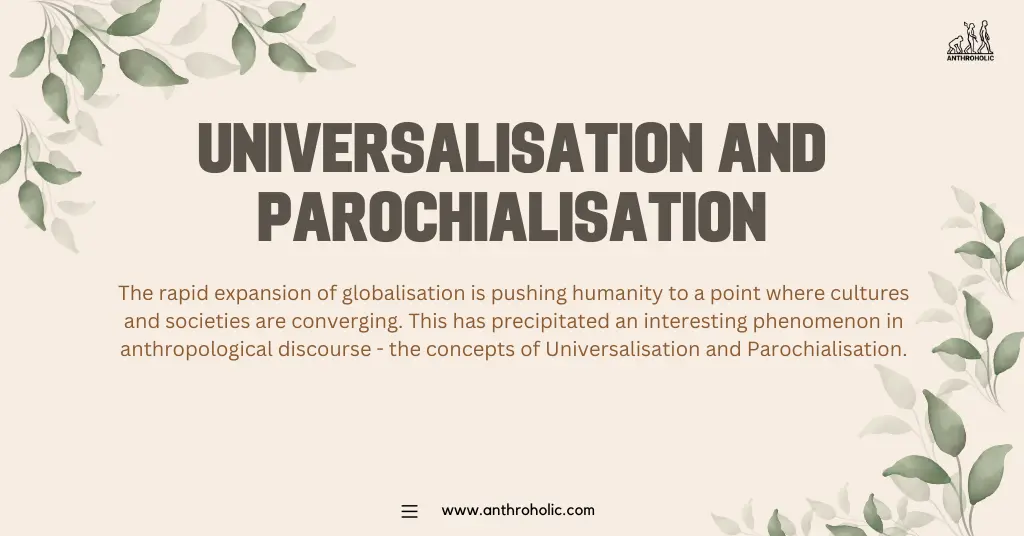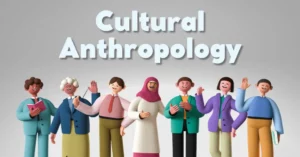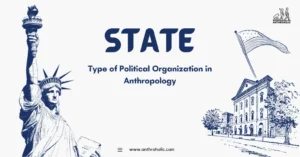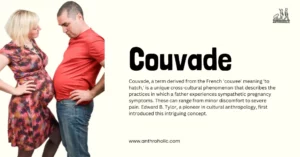AI Answer Evaluation Platform Live Now. Try Free Answer Evaluation Now
Universalisation and Parochialisation
The rapid expansion of globalisation is pushing humanity to a point where cultures and societies are converging. This has precipitated an interesting phenomenon in anthropological discourse – the concepts of Universalisation and Parochialisation.

Universalisation: Concept and Examples
Universalisation refers to the diffusion and adoption of particular cultural traits, behaviours, or values across multiple cultural boundaries, aiming to create a homogeneous global society. This process is typically propelled by powerful cultural forces, such as Westernisation or Americanisation [1].
Examples of Universalisation
- Language: English has become a universal language, used widely in business, academia, and international relations [2].
- Clothing: Western-style clothing, such as jeans and t-shirts, have been adopted universally.
- Food: Fast food, particularly American brands like McDonald’s and Starbucks, have spread globally [3].
Impact of Universalisation
Universalisation, while promoting global unity, can endanger local cultures. It can lead to the loss of indigenous languages, practices, and cultural uniqueness, contributing to a global culture that lacks diversity [4].
Parochialisation: Concept and Examples
Contrary to Universalisation, Parochialisation involves the maintenance and intensification of local or indigenous cultural traits in response to globalisation. It serves as a form of cultural resistance, helping to maintain and strengthen local cultures and identities.
Examples of Parochialisation
- Language: Despite the rise of English, many communities are intensifying efforts to preserve and promote their native languages.
- Clothing: In various parts of the world, people are promoting traditional attires, either as a part of their daily wear or during cultural festivals and events.
- Food: Many societies are encouraging the use and preservation of traditional cooking methods and local ingredients, often marketed as ‘farm-to-table’ or ‘locavore’ movements.
Impact of Parochialisation
While parochialisation helps to preserve cultural diversity, it can also lead to cultural insularity and impede cross-cultural communication and understanding.
The Interplay of Universalisation and Parochialisation
While the processes of Universalisation and Parochialisation might appear to be at odds, they often occur simultaneously within societies. A society can adopt global cultural traits while also reinforcing local ones, leading to a unique cultural hybridisation.
Hybridisation: A Balancing Act
Cultural hybridisation involves blending universal and parochial elements to create a new, unique cultural identity. Examples of such blending can be found in many modern societies.
- Spanglish: A linguistic blend of Spanish and English in the U.S. Latinx community.
- Global music genres: Blending of traditional musical elements with Western styles, such as Afrobeat, K-pop, or Bollywood music.
Conclusion
The dichotomy of Universalisation and Parochialisation represents the cultural dynamic of an increasingly interconnected world. Understanding these processes provides valuable insights into how societies and cultures negotiate their identities in the face of globalisation. While Universalisation seeks to create a global culture, Parochialisation resists this by reinforcing local cultures. However, the fusion of these processes often results in the creation of novel, hybrid cultural phenomena, shaping our world’s cultural landscape.
References
[1] Robertson, R. (1992). Globalization: Social Theory and Global Culture. London: Sage Publications. https://doi.org/10.4135/9781446280447
[2] Crystal, D. (2003). English as a Global Language. Cambridge: Cambridge University Press.
[3] Watson, J.L. (2006). Golden Arches East: McDonald’s in East Asia. Stanford: Stanford University Press.
[4] Appadurai, A. (1996). Modernity at Large: Cultural Dimensions of Globalization. Minneapolis: University of Minnesota Press.




